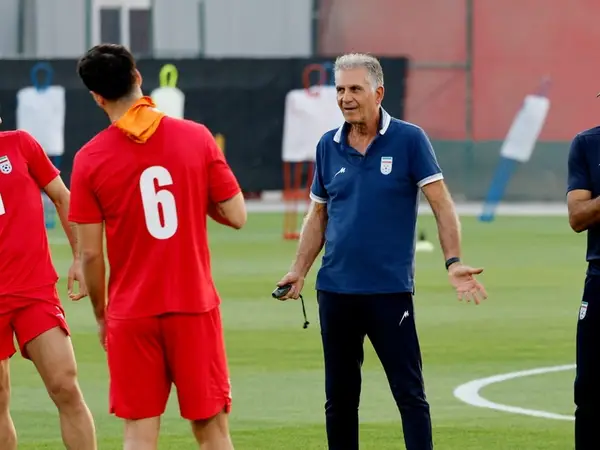A lot of Iranians love soccer but not their national football team anymore as Team Melli keeps distancing itself from solidarity with the current wave of protests across the country.
Iran’s football squad is nicknamed Team Melli – literally translated as national team – but their lack of support for the ongoing protests and their attempts to ingratiate themselves with the clerical regime has led to a new nickname for them: “Team Mullah”.
On Friday, two of the players -- Karim Ansarifard and Morteza Pouraliganji -- refused to answer questions on solidarity with women, a day after another team member, Alireza Jahanbakhsh suggested that such questions were meant to distract the team before World Cup matches.
Jahanbakhsh accused British media of distracting the team ahead of Monday's Group B opener against England and Ansarifard jumped to his defense at a news conference, repeatedly stressing team unity. "It's my professional duty to play football and your professional duty to ask questions, but we all need to do things appropriately in our profession. This is why we always defend each other and tell the truth.”
Ansarifard added that "It's an absolute honor regardless of who comes to the stadiums, whether it's our fathers, our brothers, our men or women. We play for all men and women of our country. When I say people of our country, there's no exception. That includes all men and all women. We have respect for all fans around the world. Iran has some of the best fans... We've got passionate fans who are very loyal. We're famous for it and we're very proud of them."
Ansarifard, who spent a year at British club Nottingham Forest, also talked about the team’s match against England and expressed hope that Iran would qualify for the knockout stages for the first time. "I'm relatively familiar with English football... England has one of the best leagues and some of the world's best players. I've always tried to pass on my interpretations of English football to my teammates."
When a similar question about the protests in Iran was posed to Pouraliganji, the coordinator stepped in and requested questions on the World Cup only.
Last week, national team coach Carlos Queiroz replied to a reporter, who asked him about the situation in Iran, with the same strategy, trying to divert the conversation to issues related to UK.
Their unsympathetic tone came on the backdrop of several Iranian sportsmen and women using international competitions to show their support for the protests that have rocked the country since the death of 22-year-old Mahsa Amini in the custody of the morality police in mid-September.
Numerous Iranian athletes have shown support for the protests. The Iranian football, beach football, waterpolo, basketball, and sitting volleyball teams refused to sing along with the anthem, which is customary in almost all international competitions. Authorities have made serious threats against athletes and other celebrities to stop them from public displays of solidarity with protesters but to no avail.
During the past few days, Iranian legendary striker Ali Daei and outspoken star Ali Karimi, who has been charged in absentia for supporting the protests, said they rejected invitations by Qatar to watch the World Cup matches.
Iran's first ever meeting with England is overshadowed by the events in the country, no matter how hard Iranian authorities try to keep politics out of the pitch, especially against England’s players who are known for taking the knee in protest to racial injustice. The British squad – nicknamed the “Three Lions” -- will probably kneel before their match against Team Melli in support of the protests in Iran. The Lions are likely going to be applauded by the Iranian fans better than the applause awaiting the Islamic Republic’s team.
